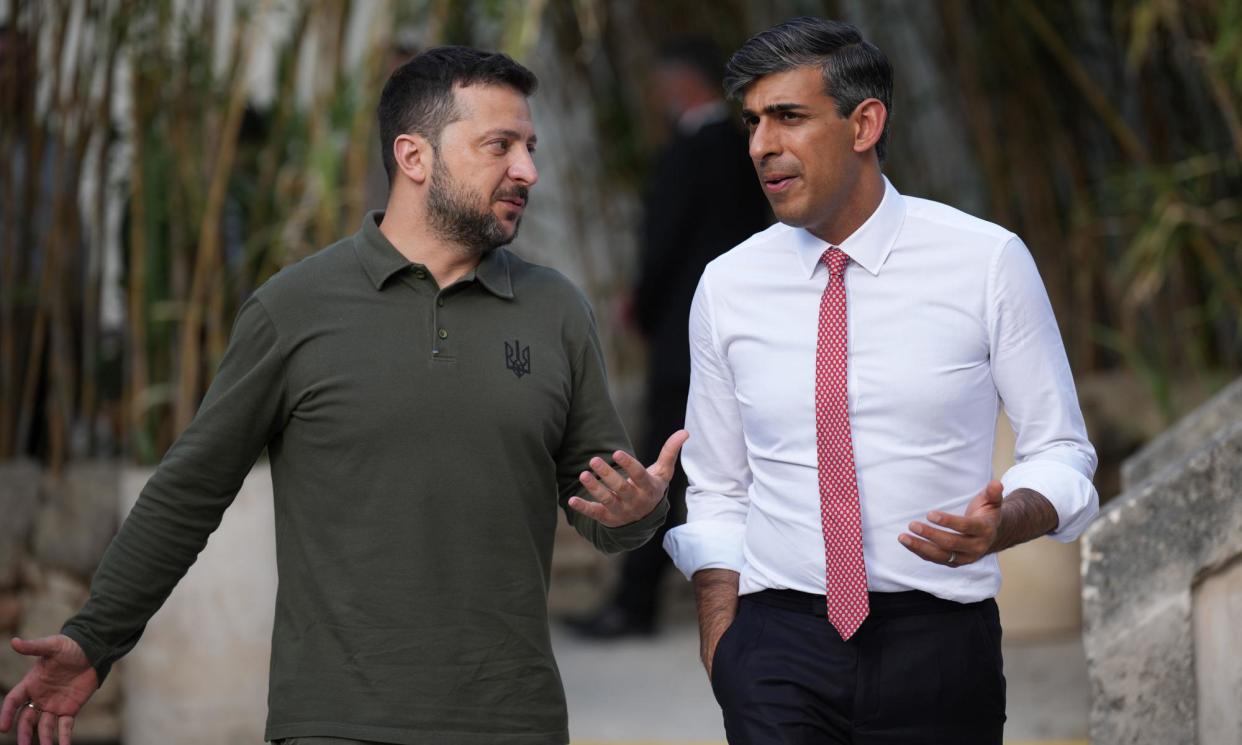What do governments abroad want from the UK election?

The UK is not the diplomatic powerhouse it once was, with Brexit leaving it looking inward and years of economic failures meaning the Conservatives and Labour are both sidelining foreign policy in their campaign messaging. Still, leaders around the world (some more than others) will be taking an interest in the 4 July election. Here are some of the key issues:
Russia and Ukraine
Kyiv is desperately fighting off the battlefield for money, weapons and diplomatic support and the backing of the next UK government could be critical. London still retains diplomatic sway in Europe and is a vocal member of Nato.
Stakes are high for the Ukrainian leader, Volodymyr Zelenskiy, as he faces the prospect of Donald Trump winning the US presidential election in November. Trump is expected to cut off US military support to Ukraine and has sought to force Kyiv to the negotiating table.
The Tories claim they have “led the world in support of Ukraine against Putin’s aggression” and will continue to do so, but it is widely expected that Keir Starmer would be equally supportive of Kyiv if Labour came to power.
Israel and Palestine
In previous elections, Israeli governments would have probably favoured conservative candidates, who have traditionally followed Washington in near-unconditional backing of Israel over Palestine.
Starmer, however, could prove the exception to the rule as his policies on the occupation have been seen through the prism of the Labour party antisemitism scandal, which he promised to fix.
Whatever his personal views on the destruction of Gaza, Starmer has been criticised by party members for a Middle East stance that could be seen as more pro-Israel than that of the Tories. The former barrister was accused of dithering for months while Israeli bombs killed more and more people. Labour’s manifesto mentions Gaza once, on page 124.
For Palestinian officials, neither a Tory nor a Labour government will give hope for the radical policy change they have been calling for.
The US
The White House is too focused on its own election to be concerned about the smaller half of the “special relationship”. Joe Biden has maintained good connections with both Labour and Conservative politicians, although Trump has a soft spot for the more extreme, populist wing of the Tory party.
Reform UK, led by Nigel Farage, has the most Trumpian politics of all the UK parties, playing up migration as a threat. Farage has previously joined Trump on campaign rallies.
China
Relations between Beijing and London have nosedived under Conservative administrations. Sunak has said that “authoritarian” China, the world’s second-largest economy, is the “greatest state-based threat to our economic security”. Bejing’s embassy in London condemned what it called Sunak’s “malicious slander against China” and urged British politicians “to end their belligerent rhetoric” and “instead, focus more on domestic economic and social issues”.
In a sense, that has happened, with Sunak largely avoiding international issues on the campaign trail. While the Conservative manifesto does brag how the Tories have “reduced Chinese influence in our critical national infrastructure and sensitive technological sectors” it does not repeatedly attack Beijing. Perhaps the most public anti-China move by the Tories was a campaign tweet suggesting Britain’s adversaries, including Xi Jinping, would welcome a Starmer-led government.
Still, Labour has not indicated any big policy shift in Asia. The party’s manifesto promises its policy on China will be to “cooperate where we can, compete where we need to, and challenge where we must”.
They're watching. https://t.co/OeTBAtDhg9 pic.twitter.com/tumr1nX5y8
— Conservatives (@Conservatives) June 19, 2024
France
Paris is distracted by trouble in its own house and not worrying too much about its neighbour. President Emmanuel Macron is facing an existential crisis in centrist French politics, with the far-right, anti-immigration party winning a historically high showing in the first round of snap parliament elections. The two-round poll has sandwiched the UK election, with the second vote taking place on Sunday.
Marine Le Pen and her National Rally (RN) party may have one eye on the Reform UK party and whether it is able to steal centre-right voters from the Conservatives on Thursday. Farage and Le Pen have shared tactics – in 2017, a year after the Brexit vote, Le Pen praised the British politician for showing other European nations a “way out of this huge prison”, referring to the EU.
The European Union
As a supranational body, the political and economic union across Europe will be facing the prospect of the first non-conservative government in London since David Cameron called the referendum that led to Brexit.
All three big parties are seeking to improve their relationship with the EU, but Labour – and certainly the Liberal Democrats – may find that easier to achieve. Officials in Brussels, where the EU institutions are headquartered, have largely moved on since Brexit and are focused not on the UK electionbut on Ukraine, Gaza, the climate crisis, the growth of the far right and trade tensions with China.
Senior Brussels sources said this week that while the EU leadership would welcome a change of UK government, it would not revise its Brexit red lines, but was open to improving existing agreements.

 Yahoo News
Yahoo News 
